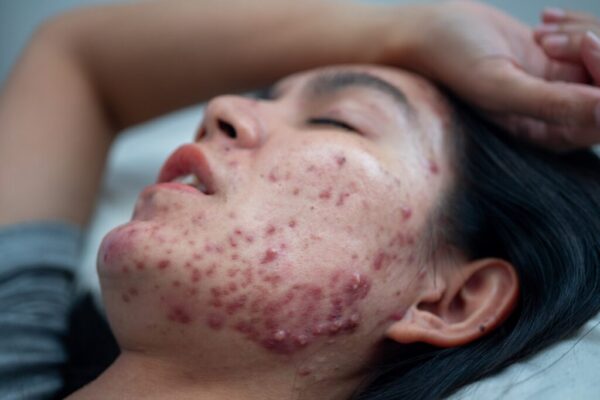Acne and Allergies: Understanding the Connection
Acne is a common skin condition that affects millions of people worldwide. While many factors contribute to acne, one lesser-known cause is allergies. This article explores the link between acne and allergies. It provides valuable insights. It has examples and useful advice for managing this condition.

What is Acne?
![]()
Acne is a skin condition that occurs when hair follicles become clogged with oil and dead skin cells. It often results in pimples, blackheads, and whiteheads. Acne can appear on the face, neck, back, chest, and shoulders. It is most common among teenagers, but it can affect people of all ages.
Understanding Allergies
![]()
Allergies occur when the immune system reacts to a foreign substance, such as pollen, pet dander, or certain foods. These substances are known as allergens. The body encounters an allergen. It makes antibodies that trigger an allergic reaction. Symptoms can range from mild (sneezing, itching) to severe (anaphylaxis).
Can Allergies Cause Acne?
![]()
Acne and allergies are different. But, they can be connected. Allergies can exacerbate acne in several ways:
- Inflammation: Allergies can cause inflammation. This can worsen acne.
- Skin Irritation: Allergens can irritate the skin, leading to breakouts.
- Immune Response: The immune system’s response to allergens can affect skin health.
Common Allergens That Can Trigger Acne
![]()
Several allergens are known to trigger or worsen acne. These include:
- Food Allergies: Dairy, gluten, and certain foods can cause allergic reactions that lead to acne.
- Environmental Allergens: Pollen, dust mites, and pet dander can irritate the skin. They can also cause breakouts.
- Cosmetic Ingredients: Some skincare and makeup products contain allergens. These can cause acne.
Case Studies and Examples
![]()
To better understand the connection between acne and allergies, let’s look at a few case studies:
Case Study 1: Dairy Allergy
Jane, a 25-year-old woman, struggled with persistent acne for years. After consulting with a dermatologist, she discovered that it’s a dairy allergy. By eliminating dairy from her diet, Jane noticed a significant improvement in her skin within a few weeks.
Case Study 2: Pollen Allergy
Tom is a 17-year-old. He had severe acne flare-ups in the spring. After allergy testing, he learned that he was allergic to pollen. By taking antihistamines and using air purifiers, Tom reduced his acne symptoms. He did this during allergy season.
Managing Acne Allergies
![]()
If you suspect that allergies are contributing to your acne, there are several steps you can take to manage the condition:
- Identify Allergens: Work with a healthcare provider. They will help you find allergens. They will do this through testing and observation.
- Avoid Triggers: Once you know your allergens, take steps to avoid them. This may include changing your diet. You can also use hypoallergenic products. And, cut exposure to allergens.
- Use Anti-Inflammatory Treatments: These treatments contain ingredients like benzoyl peroxide or salicylic acid. They can reduce inflammation and clear acne.
- Maintain a Healthy Skincare Routine: Cleanse your skin gently. Moisturize often. Avoid harsh products that can irritate the skin.
- Consult a Dermatologist: A dermatologist can give personalized advice. They can also provide treatments to manage acne and allergies well.
Statistics on Acne and Allergies
![]()
Understanding how common acne and allergies are can give context. It helps show their impact:
- Acne Prevalence: The American Academy of Dermatology says acne affects up to 50 million Americans each year.
- Allergy Prevalence: The Asthma and Allergy Foundation of America reports that over 50 million Americans have allergies each year. They have various types of them.
- Food Allergies: About 32 million Americans have food allergies. Dairy and gluten are common triggers.
Frequently Asked Questions
![]()
What is acne allergy?
An acne allergy is a reaction. It happens when your skin breaks out in pimples or rashes due to an allergen. This allergen could be certain foods. It could also be skincare products or environmental factors.
How can I tell if my acne is caused by an allergy?
Your acne might flare up after using a new product, eating certain foods, or being exposed to allergens like pollen. It might be due to an allergy. You may also notice itching, redness, or swelling.
What are common triggers for acne allergies?
Certain foods, like dairy or nuts, trigger reactions in some people. Skincare products with harsh chemicals can also cause issues. Pollen, dust, and some medications are additional triggers.
Can I treat acne allergies at home?
Yes, you can start by avoiding the suspected allergen. You can use over-the-counter antihistamines. They and gentle skincare products can help. But, it’s best to consult a doctor for proper diagnosis and treatment.
Are there specific skincare products that are better for acne allergies?
Look for hypoallergenic, non-comedogenic, and fragrance-free products. These are less likely to irritate your skin or cause allergic reactions.
How long does it take for acne caused by allergies to clear up?
It varies for each person. Once you end the allergen and start treatment, you may see improvement within a few days to a couple of weeks.
Should I see a doctor for acne allergies?
Yes, if home treatments don’t help your acne, if it’s severe, or if you’re unsure what’s causing it, seeing a doctor is wise. They can provide a proper diagnosis and treatment plan.
Can food allergies cause acne?
Yes, some people find that certain foods like dairy, gluten, or nuts can trigger acne breakouts due to an allergic reaction.
Is it possible to develop an acne allergy suddenly?
Yes, you can develop an allergy at any age, even to products or foods you’ve used or eaten for years without any issues.
How can I prevent acne allergies?
Use gentle, hypoallergenic skincare products. They prevent acne and allergies. Also, avoid known food allergens and keep your skin clean and moisturized. An allergy test can also help identify specific triggers.
Conclusion: Can Acne Be Caused by Allergies?
![]()
Acne and allergies are common. They can greatly impact a person’s life. Understanding the link helps in managing acne and reducing symptoms. By finding allergens and avoiding triggers, people can control their skin health. They can also do this by keeping a healthy skincare routine. If you think allergies cause your acne, talk to a healthcare provider. They can give you personalized advice and treatment options.
In summary, the key takeaways from this article are:
- Acne and allergies can be connected. This is through inflammation, skin irritation, and immune responses.
- Common allergens can trigger acne. They include some foods, the environment, and cosmetics.
- Case studies show the need to find and manage allergens. Doing so improves acne symptoms.
- Good management strategies include avoiding triggers. They also involve using anti-inflammatory treatments. You also need to consult a dermatologist.
Addressing the acne-allergy link helps individuals. It can help them achieve clearer, healthier skin.

